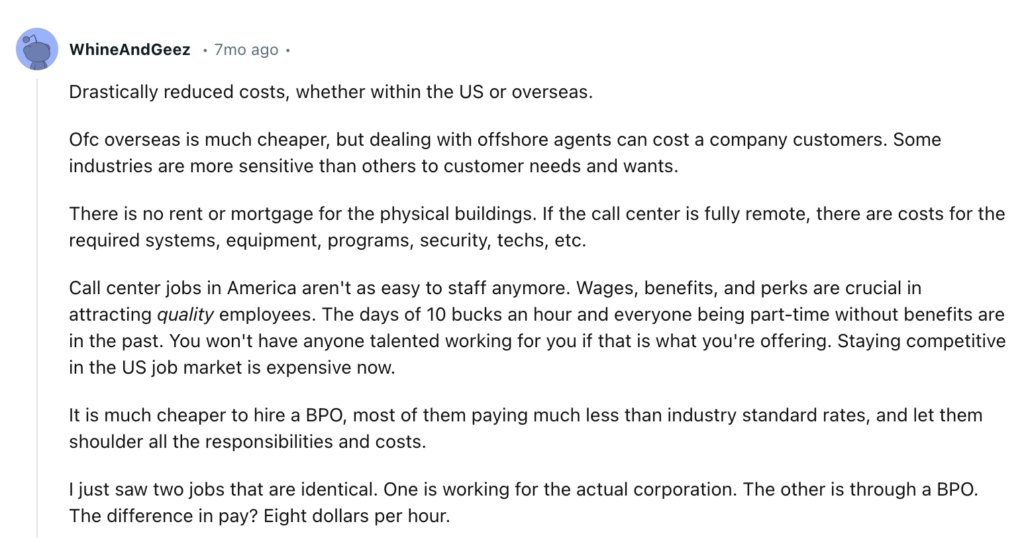Guide to Outsourcing Customer Service in 2025 (+ Top Tools and Resources to Get Started)

Table of contents
Imagine two e-commerce companies, Company A and Company B. Both sell similar products but handle customer service differently.
Company A runs its customer support in-house with the help of a dedicated team. However, the company is scaling rapidly, and their in-house support team can’t handle the volume of support requests. Moreover, staffing for peak times, such as Christmas holidays, involves hiring temporary staff, which adds a layer of complexity.
On the other hand, Company B decides to outsource customer service. They partner with a firm that provides support across multiple channels—chat, email, phone—24/7. This approach ensures that any surge in the volume of requests and queries is handled smoothly. Additionally, Company B can manage costs associated with customer support more efficiently because they only pay for the services used. The only sticking point is a certain level of personalization is missing. The support agents always follow scripts when interacting with customers.
So, what’s your takeaway here? Do you outsource or not outsource customer service?
This guide might help you decide. We examine when and why companies outsource their customer service, explore the best practices, and identify the best outsourcing companies.
Table of Contents
- What is customer service outsourcing?
- What are the pros of outsourcing customer service?
- What are the cons of outsourcing customer service?
- What are the different types of customer service outsourcing?
- Factors to consider while selecting a customer service outsourcing company
- Top 5 Customer Service Outsourcing Companies in 2025
- How to outsource customer service: 4 best practices
- Some examples of companies outsourcing customer service
- Outsourcing customer service
- Frequently Asked Questions (FAQs)
What is customer service outsourcing?
Customer service outsourcing occurs when a company hires an external organization to handle its customer service operations. This means that instead of the company’s own employees, people from a different company will handle customer support-related tasks. These include answering customer calls, responding to queries via email, and collecting feedback, among other things.
Today, shifting customer service to a third-party provider has become common. This allows companies to focus more on other aspects of their business while ensuring their customers receive the support they need.
That’s why around 68% of US companies outsource some aspect of their operations, including customer service, as part of their effort to reduce costs and increase flexibility.
What are the pros of outsourcing customer service?
Let’s take a look at a few merits of hiring a third party to handle customer service for your business:
Cost-Savings
One of the most compelling advantages of outsourcing customer service is its cost-effectiveness. According to Deloitte’s global outsourcing report, 70% of companies consider cost reduction as the primary objective for outsourcing services.
Here’s a Reddit user mentioning how outsourcing customer support helps save costs.

Think about it: when you outsource customer service, you’re basically cutting down on costs associated with hiring, onboarding, and training employees. You also circumvent having to pay salaries and benefits. In fact, Outsourcing helped IBM reduce its customer contact cost by 97%.
Tip: You could outsource your customer service to a top-tier business process outsourcing (BPO) contact center offshore, where the cost of living, wages, and operational expenses are significantly lower than in your home country. But remember that you should pay your outsourcing partner fairly for their services. To find the proper wage for your outsourcing partner, consider factors like minimum wage laws in their country, currency differences, experience, etc.
Reduced workload
Customer service is a high-pressure job. It’s also time-intensive and requires active involvement, especially when listening to customers and devising solutions.
Now, if you’re a business with limited resources, handling customer interactions in-house can get overwhelming. You might not have the necessary amount of people, and more importantly, you might not have the right skills in-house.
In such cases, it’s better to outsource. It takes a massive load off your back and leaves you with more time and resources to focus on growing the company.
Flexible coverage
When you outsource customer service, you can strike an agreement with the third-party company to be available for your customers on weekends as well. You just have to pay them more – but it’s still going to be a lot easier to do that than to expect your in-house team to pull off double shifts.
Hiver’s latest Customer Service Benchmark Survey found that 76% of companies offer support outside traditional business hours—34% of companies even offer 24×7 support. Hence, outsourcing customer service is a good option if you’re short-staffed and want to be available for customers beyond working hours or offer 24/7 support during peak times like Black Friday.
Recommended Read: How Hiver Delivers 24×7 Customer Support – The Story
What are the cons of outsourcing customer service?
There’s definitely a cost benefit to outsourcing customer service. But that’s just one side of the story. Now, let’s look at some downsides.
Limited knowledge of your product and customers
No matter how effective your outsourcing partner is, they will likely have a different understanding and knowledge of your brand and customers than you. Since they aren’t privy to your business’s day-to-day functioning, they may lack the depth, context, and nuance needed to empathize with your customers.
A recent study shows that almost 36% of global and 40% of US customers find customer service agents’ lack of knowledge to resolve their issues the most frustrating aspect of customer service. That’s because the lack of in-depth knowledge can lead to slower resolutions and more generic responses, which frustrates customers and diminishes their trust in your brand.
Lack of personal attention
Building a business is a work of passion and dedication – you’d want to ensure everything you do is impeccable. Unfortunately, outsourcing customer service can’t guarantee quality (or passion).
Your outsourcing partner will often be servicing multiple clients at once, and your business may not be their top priority. They probably won’t go the extra mile to make your customers feel special.
Why is this important? 72% of customers switch companies after a single negative experience.
No matter how cost-effective outsourcing seems, it often comes at the price of losing the personal touch and attention to detail that customers want today.
Data security concerns
Outsourcing service providers usually have robust protocols and security systems to keep your data secure. Despite all this, a data breach is still a considerable concern.
According to a survey by PwC, 81% of companies worldwide are concerned about the mismanagement of critical data by their outsourced call center agents. The same study reported that at least 18% of third-party suppliers have accidentally breached and exposed companies’ vital data.
Further, even the data transfer process to your outsourcing partner poses a high-security risk, increasing the likelihood of systems getting hacked. This is where Reverse ETL (Extract, Transform, Load) tools can be helpful, as they enable companies to transfer their data from various third-party sources, such as call center software, back to their internal systems for better control and analysis.
What are the different types of customer service outsourcing?
Before outsourcing your customer service, you must understand the many available options. You can consider the following choices and what best suits your needs.
Onshore vs. Offshore Service providers
One crucial factor when outsourcing customer service is whether you want to hire onshore or offshore call center services. Onshore customer service outsourcing occurs when the service provider is in the same country as the company. On the other hand, offshore customer service outsourcing involves partnering with a service provider in a different country.
The model you choose will typically depend on where your customers are located. While deciding this, you should consider language, cultural differences, technological infrastructure, and time zones. Some popular countries you can consider outsourcing your customer service to are India, the United States, the Philippines, and South Africa. For US-based companies, nearshore outsourcing to Latin America has gained popularity within various industries.
Shared vs. Dedicated customer support agents
In shared customer service outsourcing, the BPO’s customer support staff handles multiple companies simultaneously. This model is suitable if offering personalized support is not your priority. Or let’s say you receive thousands or tens of thousands of queries every day. Then, this model could make sense.
In contrast, if customers often contact you with complex inquiries and need an in-depth understanding of your products or services, consider using a dedicated customer service provider. They work solely for your business and can tailor their services to your company’s needs.
Factors to consider while selecting a customer service outsourcing company
To select the best customer service outsourcing company, you should consider the following factors:
- Geographical location: Choose an available partner where your customers are present. If needed, consider time zone differences to enable 24/7. Some BPOs hire for their organization from around the world. If you partner with such BPOs, offering 24/7 support would be easier.
- Flexibility and scalability: This might sound like a very basic check, but ensure that your outsourcing partner has a larger team of support staff than you do.
- Data security and privacy: Ask your outsourcing partner to share the measures they take to keep customer data secure. Run it by your internal information and security team to see if everything is proper and if they can be trusted.
- Pricing model: Choose a pricing model that aligns with your budget and service expectations. You could opt for a per-hour or per-customer query pricing, or even do a combination of both.
Now that you know what factors to consider to select an outsourcing partner, let’s look at the top 5 customer service outsourcing providers.
Top 5 Customer Service Outsourcing Companies in 2025
Are you looking for a company to outsource your customer support function to? Here are some options you can choose from:
| Company | Services | Pricing |
|---|---|---|
| Digital Minds BPO | – Inbound and Outbound Call Handling- Technical Support- Lead Generation – Appointment Setting- Email and Live Chat Support- Social Media Management. | Customized proposals within 1-2 days of the request |
| Partner Hero | – Multichannel Customer Support- Customer Care- Help Desk Support- E-commerce Support- Technical Support- Seasonal shifts- Fractional help | Starts at starts at $10 / hr |
| HelpSquad BPO | – Multichannel customer support- Digital And Voice Customer Support- AI Operations- Back-Office Support- Call Center And Answering Services- It Support & Technical Assistance | Starts at $185 monthly for 50 unique chats/engagements. |
| Teleperformance | – Back-office support- Retail & E-commerce Customer Service – Digital CX and AI- Omnichannel Journey Orchestration- Business Messaging- AI-based Bots- Virtual Assistants- Cloud Contact Center Capabilities | Customized proposal |
| TELUS International | – Customer Care- Technical Support- Social Media- Optimizing Self-Serve Options- Troubleshooting Complex Issues- Voice And Chat Support | Customized proposal |
Please note that all these companies provide flexible customer support solutions, including on-demand customer service and 24/7 support.
How to outsource customer service: 4 best practices
You’ve weighed the pros and cons of outsourcing. If you still feel like it’s the right thing to do, here are four best practices you need to keep in mind.
1. Set clear expectations with your customer service provider
If you’ve decided to outsource customer service, the most important thing you need to do is sit down with your outsourcing partner and set specific expectations and goals. You might have to do this over several meetings, but don’t get perturbed.
You need to be able to translate your understanding of your business’s vision and how customer service ties into your overall strategy to the outsourcing partner. Always quantify what you expect from the partnership.
For example, your goals may look something like:
1. Improving first-call resolution by 50%
2. Provide a response to every query within 30 mins
3. Improve CSAT by 15% in the first 3 months.
Setting goals—and, in many cases, SLAs—helps you determine the outsourcing partner’s effectiveness in the short run.
2. Take complete charge of training and quality
Remember that your outsourcing partner has an extensive client portfolio. Their staff probably handles support for multiple clients simultaneously. With this, comes a few issues.
For instance, if you’re an insurance company, your brand voice and language can’t be the same as that of a women’s apparel brand. So, how do you ensure customer interactions align with these guidelines? Take charge of training the outsourced team.
Ensure they know and understand everything about your business—from your brand’s vision to the most intricate technical aspects. This also includes the most commonly asked customer questions and how to answer them. You can also consider educating the third-party staff about cultural differences and their implications for your brand communication.
3. Hold regular meetings and review discussions
Once a month, sync up with your outsourcing partner to check how things are going. What are the most common customer issues? What is the average response time like? How do customers rate the quality of support provided?
Ideally, you should have a dashboard where all the important metrics can be seen at a glance, and if needed, you can dig deeper into specific ones.
These sync-up calls help you get insights into how you can optimize customer experience.
For example, if the outsourcing partner tells you that customers have been reaching out to ask about how to use a specific feature, you should add a solution for this to your knowledge base.
4. Implement data security and compliance measures
Last but most important is ensuring that your customer’s data is safe. This includes names, addresses, payment details, and customer preferences.
If your outsourcing partner doesn’t take the proper precautions, there’s a risk that this information could be exposed to hackers or used in the wrong way, which could cause your business serious legal and reputation problems.
To ensure your customers’ information is protected, start by choosing a service provider that follows industry rules like GDPR, CCPA, or HIPAA (if they apply to your industry).
Ask about how they encrypt data, control who can access it, and store and protect customer information. Check that they have the right certifications and are regularly checked to show they follow these rules.
Example: If you work in healthcare, ensure the customer service outsourcing company uses a HIPAA-compliant tool to protect patient information.
Some examples of companies outsourcing customer service
- Slack
Slack is a workplace communication tool. The company outsources customer service to provide round-the-clock global support. This allows the team at slack to ensure availability without needing to grow their internal teams, especially during periods of high demand. - Airbnb
Airbnb outsources parts of its customer service, particularly for handling inquiries related to bookings and disputes. This helps Airbnb scale customer support during peak travel seasons and ensure multilingual options to avail assistance.
- WhatsApp
Owned by Meta, WhatsApp outsources its customer service to manage a vast number of user requests globally. Outsourcing helps WhatsApp deal with inquiries related to security, user data, and account issues in various languages
- Google
Google outsources some of its customer services, especially for non-core services such as Google Ads and Google Play support. This allows the company to maintain high availability while focusing on its primary business goals. - Amazon
One of the most famous ecommerce brands, Amazon heavily relies on outsourced customer service – especially for managing queries related to marketplace and third-party sellers. The company collaborates with onshore and offshore call centers to offer 24/7 customer support during peak periods such as Black Friday and Cyber Monday.
Outsourcing customer service
Outsourcing customer service is a smart move for businesses looking to save money, improve efficiency, and provide a satisfactory level of service for customers. When selecting an outsourcing partner, consider cultural alignment, geographical location, flexibility, and scalability factors.
Use this guide as a starting point to explore outsourcing possibilities and find the right partner to help your business achieve its full potential. Just remember, outsourcing customer service doesn’t mean sacrificing quality or personality. With the right partner, you can provide excellent customer service and save money.
Frequently Asked Questions (FAQs)
What is customer service outsourcing?
When a business partners with a third-party provider to handle some or all of its customer care operations, it is called customer service outsourcing. This strategy allows companies to get access to specialized expertise and advanced technology at a lower cost compared to running an in-house support team.
Is it cheaper to outsource customer service?
Yes, outsourcing customer service can be more cost-effective than maintaining an in-house team. For instance, outsourcing to a call center can reduce overhead by eliminating the need for businesses to invest in technology solutions, infrastructure, and training.
What is contact center outsourcing?
Contact center outsourcing involves hiring a third-party company to manage customer interactions for a business, including inbound and outbound calls, email support, live chat, and social media interactions.
Top customer service outsourcing companies?
Teleperformance, Digital Minds BPO, HelpSquad, Partner Hero, and Telus International are top 5 customer service outsourcing companies.

































